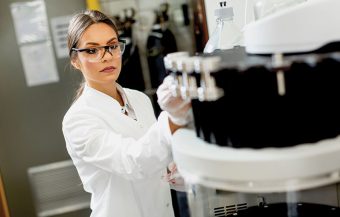One of the biggest global challenges facing modern society today is the decreasing availability of safe, potable water resources. Elevated arsenic levels in groundwater, a primary drinking water resource worldwide, seriously threaten public health.

A multidisciplinary team of scientists from the Faculty of Sciences at the University of Novi Sad and the Institute for Multidisciplinary Research at the University of Belgrade is implementing the NanoCompAs project to develop an innovative and long-term sustainable solution for arsenic removal from water. The significance of research in this area has been recognized by the Science Fund of the Republic of Serbia, which has facilitated the NanoCompAs project as part of the Green Program for Science and Industry Collaboration. Adsorption is the most commonly applied technique for arsenic removal in drinking water treatment due to its high cost-effectiveness, efficiency, and technical simplicity in handling and process control. Most commercially available adsorbents require pretreatment to convert arsenic into a removable form, but this adds to the cost of water treatment, making it less feasible for less-developed areas most affected by this issue. Researchers are actively developing high-efficiency nanomaterial-based adsorbents to find an effective and affordable solution. One next-generation material is FeMn binary oxide (FMBO) nanoparticles, which have already shown high arsenic removal efficiency in laboratory settings but are challenging to implement in continuous-flow systems.
IN FOCUS:
To overcome these limitations, the NanoCompAs project will develop a bifunctional nanocomposite filter medium (FMBOnc), forming the basis for commercializing the product—a filter applicable to continuous water treatment processes. The next step will involve scaling up the production of the filter medium to ensure sufficient material quantities for further laboratory and semi-industrial research. Initial testing of the filter will include physical-chemical characterization, quality control, and arsenic removal efficiency assessments.
The project team is exploring potential solutions to extend the lifespan of FMBOnc and enable its reuse. Depending on requirements, they are also evaluating options for stabilizing the material before disposal in landfills. Semi-industrial-scale research, which includes treating larger quantities of groundwater from the Autonomous Province of Vojvodina, will confirm the effectiveness of FMBOnc in reducing arsenic levels in water.
As a team, we anticipate that the NanoCompAs project will develop an economical and efficient solution for removing arsenic from drinking water, significantly improving the health and quality of life of people in regions affected by this problem. The project’s results will also benefit policymakers and the academic community focused on environmental protection technologies.
The NanoCompAs Project Team
Read the whole story in the new issue of the Energy portal Magazine ECOLOGICAL TRANSPORT

